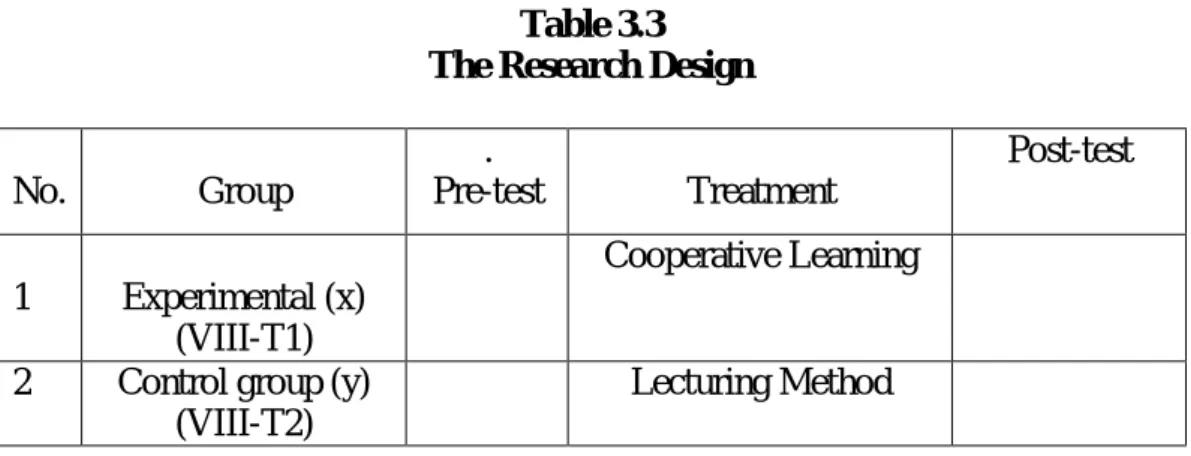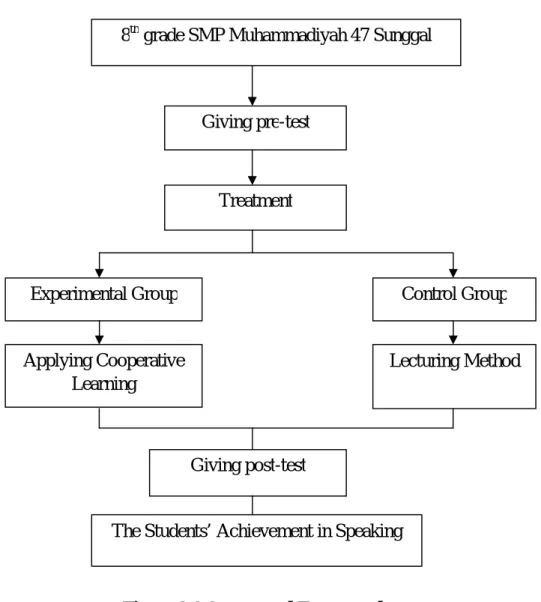Jifanisah, Jihan The Effect of Applying Cooperative Learning on Students' Speaking Performance” Skripsi: English Teaching Program, Faculty of Teacher Training and Education, University of Muhammadiyah Sumatera Utara. The aim of this study was to find out the significant effect of applying cooperative learning on students' speaking skills. The sample of this study was VIII T1 and VIII T2, which was taken by a simple random sampling technique and then used as an experimental group, and treated with the application of cooperative learning.
This research was intended to fulfill one of the requirements for an S-1 degree in the English Department of the Faculty of Teacher Training and Education, Muhammadiyah University, Sumatera Utara. Further, at the conclusion of the research entitled "The effect of the use of cooperative learning on students". Speech Achievements”, she faced many problems and difficulties and without much help from the following people, it was impossible for her to finish it.
Dewi Kesuma Nasution, S.S., M.Hum as the third Vice Dean of the Faculty of Teacher Education and Training. Mandra Saragih, S. Pd, M. Hum and Pirman Ginting, S. Pd, M. Hum as Head and Secretary of the Department of English at the Faculty of Teacher Training and Education, University of Muhammadiyah Sumatera Utara for their encouragement in completing this research. Winona Emelia, M.Sc. Hum as a supervisor who provided her with many suggestions, criticisms, guidance, ideas, support and time in the writing of this study.
Mandra Saragih, S.Pd, M.Hum as a reviewer who gave her suggestions, critics and advice in this research.
INTRODUCTION
- The Background of The Study
- The Identification of The problem
- The Scope and Limitation
- The Formulation of The Problem
- The Objective of The Study
- Significance of The Study
One of the reasons is the ineffective media, especially during the English-speaking teaching and learning process. The English teacher did not use an interesting method to carry out the teaching and learning process. In SMP Muhammadiyah 47 Sunggal, the media for teaching and learning process were available, whereas the English teacher in SMP Muhammadiyah 47 Sunggal still had difficulties in using these media in teaching.
Referring to the above discussion, there are some problems with the quality of speech teaching and learning in SMP Muhammadiyah 47 Sunggal. These problems are believed to have a major impact on the quality of English-speaking teaching and learning process. Based on the above reasons, the researcher here comes up with doing a study that gives the title "The Effect of Applying Cooperative Learning on The Students' Speaking Achievement".
The English teacher did not use interesting media to develop the teaching and learning process. The English teacher of SMP Muhammadiyah 47 Sunggal still had difficulties in implementing these media in the teaching and learning process.
THE REVIEW OF RELATED LITERATURE
Theoretical Framework
- Description of Effect
- Description of Speaking
- Background to Teach Speaking
- Principle for Teaching Speaking
- Types of Classroom Speaking Performances
- The Difficulties of Speaking
- The Skill of Speaking
- Classroom Speaking Activities
- The Disadvantages of Cooperative Learning Approach
- Cooperative Learning Practice
- Types of Cooperative Learning Groups
Speaking is a language skill that develops in childhood, beginning with the ability to listen. A foreign language (FL) context is one where the target language is not the language of communication in society. A second language (SL) context is one where the target language is the language of communication in society.
Pair work and group work activities can be used to increase the amount of time learners get to speak in the target language during lessons. Research indicates that learners make progress by communicating in the target language, because interaction necessarily involves trying to understand and making yourself understood. process is therefore called negotiation of meaning. Teaching practices that provide opportunities for students to learn together in small groups are known as Cooperative Learning.
Cooperative learning means that children learn together in groups, which are structured so that group members must work together to succeed. They discover that cooperative learning ensures that more students are actively involved in learning. Cooperative learning improves students' communication skills and increases their ability to be successful in the world of work and live in society.
Cooperative learning helps engage more children actively in learning than teacher-centered or lecture-oriented methodologies. Cooperative learning encourages students to support their classmates in a group rather than compete against each other. Cooperative learning provides the opportunity for higher achieving students to help students who are slower learners.
The help of these students also increases the amount of explanation that generally occurs in the classroom. Cooperative learning helps to improve the motivation of many students by providing the opportunity for more students to experience the joy of winning (in the case of cooperative activities that require games) and academic success. Based on the above explanation, it can be concluded that the advantages of cooperative learning activity is that the students are easy to participate in a discussion.
To build a lesson in the cooperative learning model, the following 5 principles and elements should be included. Each student in the same groups has a unique contribution to make to the joint effort.
Conceptual Framework
These groups are set up so that members offer support to each other so that everyone can succeed academically. These groups can last from several minutes to several class sessions to complete a specific task or assignment. These groups are temporary, ad hoc groups that last for a few minutes, one discussion or class period.
Their goals are to focus the student's attention on the material to be learned, create a set of expectations and mood conducive to learning, and help organize in advance the material to be covered in a class session. Most of them think it is difficult and have no idea how to speak well. Based on the observation conducted by the researcher at SMP Muhammadiyah 47 Medan Krio, they still have some problems in the study of speaking, they are: They do not understand when teachers speak in front of the class, they are not interested in learning English.
Based on the students' problems and theoretical overview of speaking above, the researcher believes that by using Method Cooperative Learning, the students' performance in speaking will increase, because Method Cooperative Learning is supposed to be very effective.
Hypothesis
METHOD OF RESEARCH
- Location
- Population and Sample
- Population
- Sample
- Research Design
- Instrument of Research
- The Technique of Collecting Data
- The Technique of Data Analysis
The post-test was the last test in this research, especially when measuring the treatment, whether it was significant or not, it means to know whether the treatment had an effect or not on the students' performance in speaking. The administration of the post-test was intended to find out differences in the scores of both experimental and control groups before and after the treatment. Calculation of the total score Pre-test and Post-test in experimental group and control group.
Meanwhile, in the control group of students, the total pretest score was 1291, with a minimum score of 50 and a maximum score of 85 (see Appendix 3). In the control group, the students' total post-test score was 1663, with the lowest score being 70 and the highest post-test score being 85 (see Appendix 4). After obtaining the students' pre-test and post-test scores of the two classes, it was known that there was a difference in the speaking skills of the students after the treatment.
Based on table 4.1 above, it can be seen that there were differences between the pre-test and post-test of the experimental group. After calculation, the data for the experimental group of the above pre-test scores was 1422, and the total post-test score was 1857. The pre-test and post-test students' score in the control group None Initial pre-test score of students. .
Based on table 4.2 above, it can be seen that there were differences between pre- and post-test of control group. After calculation, the data for the control group was above score pre-test 1291 and total score post-test was 1633. 164721 Based on table 4.1 above, it can be seen that there were differences between pre-test and post-test experimental class.
After calculation, the data for the experimental group above the pre-test score was 1422 and the total post-test score was 1857. Based on Table 4.2 above, it can be seen that there were differences between the pre-test and post-test test score of the control group. class. After calculating the data for the control group above, the pre-test score was 1291 and the post-test total score was 1663.

DATA AND DATA ANALYSIS
Data
In the experimental group, the students' total pre-test score was 1422 with the lowest pre-test score being 50 and the highest being 85 (see appendix 1).
Data Analysis
After measuring the above data, using the t-test formula showed that the t-test value was 16.19. After searching for the t-test distribution table as accounting for certain degrees of freedom (df). It means that the percentage of the effect of x towards y or The effect of the application of cooperative learning on students' speaking achievement was 70% and 30% was the influence of other factors 2.021.
Testing Hypothesis
Research Findings
Based on the results and the data analysis, the researcher could conclude as follows: There was significant effect of using cooperative learning on students' speaking performance is proven by the result of the test t-test>t-table or 16.19>2.021 . It means that the result of the analysis showed that t-test was higher than t-table with the level of significant 0.05 and the degree of freedom (DF) = 40. Cooperative Learning provides stimulus for the students to become active learning and accept the lesson that the teacher gave.
Students are active in giving opinions and speaking in front of the class. To other researchers, it is suggested to conduct further research related to the topic of the study. The effect of applying the guided writing technique on students' achievement in writing an analytical expository text.
CONCLUSION AND SUGGESTION
Conclusion
